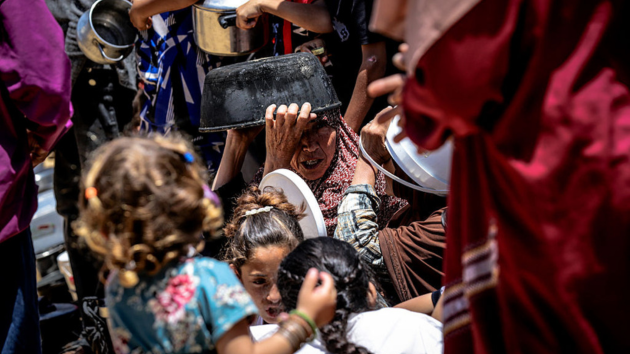
(GAZA) -- After 11 weeks of a total blockade of aid into Gaza, two United States-backed food distribution centers opened in the southern Gaza city of Rafah on Tuesday, sparking chaos as thousands descended on the area in search of food.
Palestinians were seen flooding into sites in hopes of getting much-needed aid since Israel enforced a total humanitarian blockade on March 2.
The sheer volume of people, however, led to the centers in Rafah being overrun, gunfire erupting and staff being evacuated to safety.
Israel Defense Forces said in a statement that troops fired "warning shots" in the area of the distribution site as people flooded in, but said no aerial fire was launched toward the site.
"Control over the situation was established, food distribution operations are expected to continue as planned," the IDF said.
Operated by the U.S.-led Gaza Humanitarian Foundation (GHF), two distribution sites located in Rafah's Tal al-Sultan neighborhood and the Morag Corridor began distributing food to thousands of families on Tuesday.
State Department spokesperson Tammy Bruce said in a statement that aid operations by the Gaza Humanitarian Foundation "have succeeded," but acknowledged, "it's not surprising that there might be a few issues involved."
Bruce said 8,000 food boxes have been distributed so far, totaling 462,000 meals delivered to Palestinians in need.
Bruce said the aid distribution was a triumph over Hamas, which she said restricted humanitarian aid flow at an earlier date by breaking the ceasefire with Israel.
"This process managed to overcome that dynamic, and the dynamic has changed," the press secretary said.
The U.S.-led humanitarian plan, however, faced widespread criticism from established aid organizations that have been operating inside Gaza for the past 19 months, including criticism about whether the GHF has enough experience to mount a large-scale humanitarian operation.
On Tuesday, United Nations spokesperson Stephane Dujarric said in a statement that the scene in Rafah is "heartbreaking, to say the least."
Dujarric said no fuel is currently available in southern Gaza and only one-third of the required supply was received last week.
Dujarric called for the "opening of all crossing points for humanitarian aid and commercial goods," adding that the U.N. and its humanitarian partners "stand ready to deliver at scale."
"International law must be respected and humanitarian operations must be enabled without any further delay," Dujarric added.
The Israeli blockade of humanitarian aid entering Gaza has caused widespread malnutrition and conditions likely to lead to famine, according to the U.N. and other international aid organizations.
One in five people in Gaza, about 500,000 people, face starvation, the Integrated Food Security Phase Classification platform said on May 12, according to the U.N.
Israeli Prime Minister Benjamin Netanyahu said the distribution sites were set up in a way to prevent looting by Hamas.
"The idea is basically to take away the humanitarian looting as a tool of war of Hamas to give it to the population," he said.
Netanyahu said that by giving people boxes of food rather than bags of flour, it's "very hard for Hamas to steal it, especially because we guard these positions."
Copyright © 2025, ABC Audio. All rights reserved.

